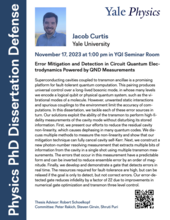Error Mitigation and Detection in Circuit Quantum Electrodynamics Powered by QND Measurements
Superconducting cavities coupled to transmon ancillae is a promising platform for fault-tolerant quantum computation. This pairing produces universal control over a long-lived bosonic mode, in whose many levels we encode a logical qubit or physical quantum system, such as the vibrational modes of a molecule. However, unwanted static interactions and spurious couplings to the environment limit the accuracy of computations. In this dissertation, we tackle each of these error sources in turn. Our solutions exploit the ability of the transmon to perform high-fidelity measurements of the cavity mode without disturbing its stored information. First, we present our efforts to reduce the residual cavity non-linearity, which causes dephasing in many quantum codes. We discuss multiple methods to measure the non-linearity and show that our mitigation technique can fully cancel cavity self-Kerr. Next, we construct a new photon-number resolving measurement that extracts multiple bits of information from the cavity in a single shot using multiple transmon measurements. The errors that occur in this measurement have a predictable form and can be inverted to reduce ensemble error by an order of magnitude. Finally, we develop and demonstrate a gate that detects errors in real time. The resources required for fault-tolerance are high, but can be relaxed if the goal is only to detect, but not correct errors. Our error-detected gate reduces infidelity by a factor of 22 due to improvements in numerical gate optimization and transmon three level control.
Thesis Advisor: Robert Schoelkopf
Committee Members: Peter Rakich, Steven Girvin, Shruti Puri
Livestream the event on Zoom (open to all, family and friends welcome!)
